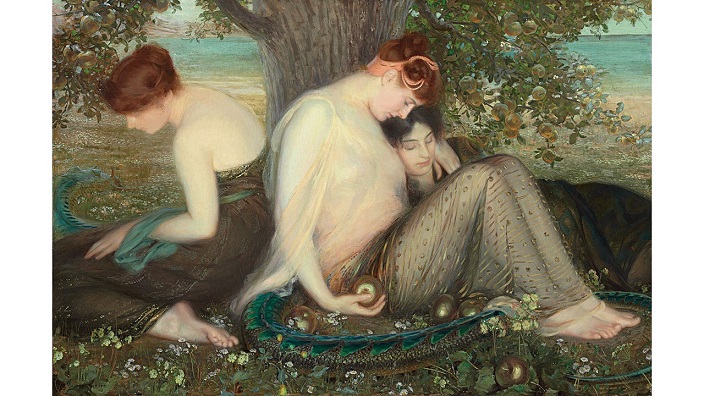.
The Thief
He stole my song, my music;
He stole my poetry.
He broke my holy vessels
And felled my sacred tree.
He climbed my garden’s rampart
And stole amongst the leaves
And stole away the apples
of my Hesperides.
Then I was left to wither
Within my walls of stone.
A winter overtook me
With loneliness unknown.
All my fragrant arbors
Died and dried and fell
Around that stump decaying
Into my poisoned well.
And I was grieved beholding
The ruin he had done
In stealing from my garden
The apples of the Sun.
.
.
Patricia Rogers Crozier has been published in The Washington Post. She holds a B.S. in Physics from Mississippi College. She resides in Gulf Breeze, Florida, where she works at the bakery in Publix.















I enjoyed this, Patricia. The meter is nigh on impeccable.
I enjoyed your poem also, Patricia. Thank you.
That is a beautifully written poem with intrinsic sadness and regrets for a thief of hearts, one who was let in and then stole the best one had to offer!
A fascinating choice of literary allusion to express feelings of grief over personal betrayal, loss, and despoiling. The Garden of the Hesperides with its golden apples, perhaps the most luxuriant of all gardens according to Greek mythology, serves as the perfect metaphor for something rich and precious that one possesses, which is cruelly plundered by an intruder. The iambic trimeter meter you have chosen, with its short, jabbing lines, seems well-suited to the content of the poem. The brief exclamations, one after another, create a sense of lamentation that underscores the theme of loss.
Beautiful. I enjoyed the allusions too. It seemed to me that there were several layers in the poem, symbolic apples and the theft of something much more precious.
A beautiful but sad poem. Thank you Patricia.
I agree with Martin about the iambic trimeter lines, and how their “short, jabbing” quality fits in perfectly with the sadness and lamentation of the poem. I recall these four lines from an old poem, but the name of the author escapes me:
They bring to mind the sorrow
That lies beneath all earth —
The pain, the grief, the terror;
The emptiness and dearth.
Crozier has the same form for her quatrains: the odd lines end feminine and do not rhyme, while the even lines end masculine and do.
I always like this poet’s rhythms and the darkly mysterious way her poems speak, half-disclosing something secret out of ancient contexts.
I liked this elegant, sorrowful poem so much I looked up the rest of your poems here, Patricia. They all seem sophisticated and beautifully mysterious. I would buy a book of your poems.
As Rohini suggests, there must be layers to the poem. There is certainly loss wrongly inflicted by someone, and mourning for it. This allows every reader to apply it personally as he or she will. But since the work is based in classic myth, there can be questions about mythic identities and themes. It was Gaia (Mother Earth) who planted the garden, and gave it to Hera (protectress of marriage) as a wedding gift (if I recall correctly). Thus the theft could be a despoiling of the earth or of marriage.
But in myth, the character who takes the golden apples out of the garden is Atlas, because Heracles needs them to accomplish one of his extreme labors. Atlas is sometimes considered the father of the nymphs who guard the golden apples. Is this a father stealing a daughter’s treasure? Anyway, it’s a man. “He” is accused 4 times in early lines, and near the end “he” is responsible for grief and ruin.
The enchanting poem is open to varied possible interpretations.
Congratulations, Patricia!
I recognize your name, and I think we knew each other as children in Italy.